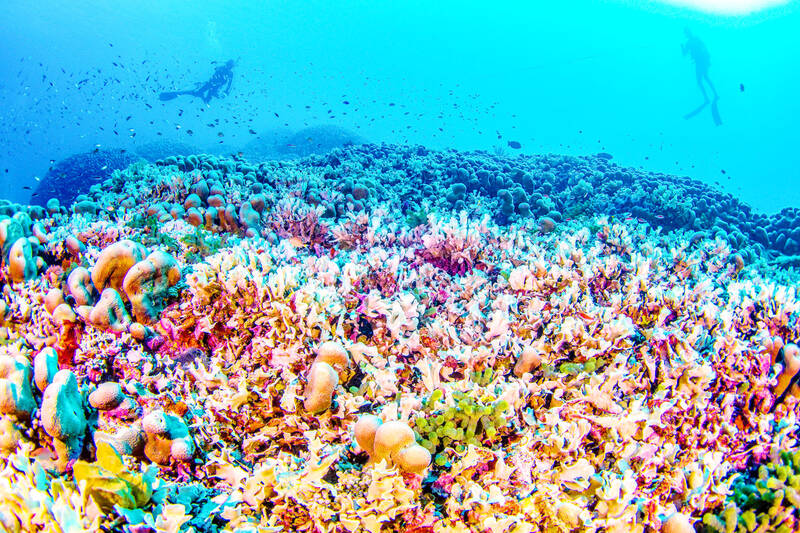Scientists yesterday said they have found the world’s largest coral near the Pacific’s Solomon Islands, announcing a major discovery “pulsing with life and color.”
The coral is so immense that researchers sailing the crystal waters of the Solomon archipelago initially thought they had stumbled across a hulking shipwreck.
“Just when we think there is nothing left to discover on planet Earth, we find a massive coral made of nearly 1 billion little polyps, pulsing with life and color,” marine ecologist Enric Sala said.

Photo: AFP / Manu San Felix / National Geographic Pristine Seas
The standalone structure had been growing for about 300 years, the researchers said, formed from a “complex network” of tiny coral polyps.
It was distinct from a coral reef, which is made from many distinct coral colonies, they said.
Measuring 34m wide and 32m long, the team said the “mega coral” was three times bigger than the previous record holder — a coral dubbed “Big Momma” in American Samoa.
“While Big Momma looked like a huge scoop of ice cream plopped down on the reef, this newly discovered coral is as if the ice cream started to melt, spreading forever along the seafloor,” lead scientist Molly Timmers said.
It was longer than a blue whale and was thought to be “so colossal” that it could “be seen from space.”
The coral was discovered at the southeastern tip of the Solomon Islands in an area known as the Three Sisters. It was spotted by a National Geographic team embarking on a scientific expedition in the region.
“While the nearby shallow reefs were degraded due to warmer seas, witnessing this large healthy coral oasis in slightly deeper waters is a beacon of hope,” coral scientist Eric Brown said.
The lush rainforests and pristine waters of Solomon Islands have long been celebrated for their ecological diversity.
“There is so much to learn about the richness of marine life and the ocean ecosystem, but this finding opens doors of knowledge,” Solomon Islands official Collin Beck said. “More scientific research is needed to better understand our rich biodiversity and our planet.”

ANGER: A video shared online showed residents in a neighborhood confronting the national security minister, attempting to drag her toward floodwaters Argentina’s port city of Bahia Blanca has been “destroyed” after being pummeled by a year’s worth of rain in a matter of hours, killing 13 and driving hundreds from their homes, authorities said on Saturday. Two young girls — reportedly aged four and one — were missing after possibly being swept away by floodwaters in the wake of Friday’s storm. The deluge left hospital rooms underwater, turned neighborhoods into islands and cut electricity to swaths of the city. Argentine Minister of National Security Patricia Bullrich said Bahia Blanca was “destroyed.” The death toll rose to 13 on Saturday, up from 10 on Friday, authorities

Local officials from Russia’s ruling party have caused controversy by presenting mothers of soldiers killed in Ukraine with gifts of meat grinders, an appliance widely used to describe Russia’s brutal tactics on the front line. The United Russia party in the northern Murmansk region posted photographs on social media showing officials smiling as they visited bereaved mothers with gifts of flowers and boxed meat grinders for International Women’s Day on Saturday, which is widely celebrated in Russia. The post included a message thanking the “dear moms” for their “strength of spirit and the love you put into bringing up your sons.” It

In front of a secluded temple in southwestern China, Duan Ruru skillfully executes a series of chops and strikes, practicing kung fu techniques she has spent a decade mastering. Chinese martial arts have long been considered a male-dominated sphere, but a cohort of Generation Z women like Duan is challenging that assumption and generating publicity for their particular school of kung fu. “Since I was little, I’ve had a love for martial arts... I thought that girls learning martial arts was super swaggy,” Duan, 23, said. The ancient Emei school where she trains in the mountains of China’s Sichuan Province

DISASTROUS VISIT: The talks in Saudi Arabia come after an altercation at the White House that led to the Ukrainian president leaving without signing a minerals deal Ukrainian President Volodymyr Zelenskiy was due to arrive in Saudi Arabia yesterday, a day ahead of crucial talks between Ukrainian and US officials on ending the war with Russia. Highly anticipated negotiations today on resolving the three-year conflict would see US and Ukrainian officials meet for the first time since Zelenskiy’s disastrous White House visit last month. Zelenskiy yesterday said that he would meet Saudi Arabian Crown Prince Mohammed bin Salman, the nation’s de facto leader, after which his team “will stay for a meeting on Tuesday with the American team.” At the talks in the Red Sea port city of Jeddah, US